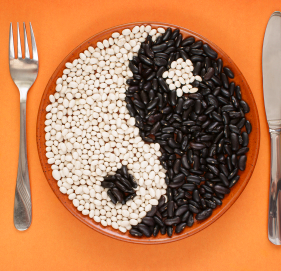The title of this post is kind of hilarious for a few reasons. First, what is a “spiritual practice,” anyway? It looks different for every person. Second, how would I know what diet is best for your personal spiritual practice? It would be kind of insane for me to throw out a blanket statement about diet and spirituality that would work for everyone in every culture and spiritual affiliation. (Plus, my inbox would get flooded with criticism). ;) So you can rest easy, that’s not what I’m doing here.
I am, however, going to give you some different outlooks on diet from teachers that I’ve found particularly interesting, and you can see how you feel for yourself.
Whether your personal form of spirituality involves practicing yoga, meditation, prayer, journaling, spending time in nature, going to church, following one or more spiritual teachers, chanting, being creative, hanging out in the self-help section at Barnes & Noble, helping others, or maybe just trying to be a nicer human on this planet, what you eat can have a big impact on how deep you can go with it. In my opinion, the best diet as it relates to spirituality is one that allows you mental clarity, calmness, connection to your intuition and openness to new insights.
Lowering your level of anxiety, fatigue and mental fog is a great place to start if you’re looking to deepen any type of meditation or spiritual practice. Your diet plays an absolutely huge role in your mental state and how your body functions. I was just talking to a friend this morning about how what we eat is “raw data,” and the food we put in our mouths literally becomes the cells of our bodies and our brains. For this reason, it’s important to put high quality data in if you want to have a high quality experience.
The inspiration for this blog came from the Sarva Yoga Academy yoga/meditation retreat I went on last weekend in Vermont. My teacher, Michael Hewett, gave us a manual to read over, which he called “the best advice I’ve ever received for how to effectively ride the prana (life force, energy) within the context of life, both inside and outside retreat.” The manual was created based on years of insight from meditation teachers and long meditation retreats, and it was designed to guide people to have the best experience with meditation. I was particularly interested in the dietary advice, and found it insightful for any type of spiritual/creative practice. Here are some insights from it:
All of these things can negatively affect your practice (and your life) – difficulty sleeping, heart racing, feeling jittery, anxious, ungrounded, panicky, general feeling of nervousness, restlessness, irritability, short/unsteady breathing, feeling aggressive/snappy, feeling wired, scattered, obsessive compulsive, etc. These can often be addressed through the diet.
“Diet has huge impact. A yogi takes really good care of himself [or herself], so don’t put trash in your body. Once you discover in retreat what diet does to you, you realize that when you go back to your life in the busy world that diet does the same thing to you there, but you just don’t realize it.”
“Even a spot of sugar in retreat will ruin a day or two. And it doesn’t make any difference if it’s honey or sugar. In fact, stay away from any kind of starch and anything with caffeine – coffee, tea, chocolate.” (Michael pointed out to me that in some cases, like having some yerba mate or dark chocolate, these things can be medicine).
It also mentioned reducing nightshade vegetables (tomatoes, potatoes, eggplant and peppers). This wasn’t surprising to me, because in Dr. Lipman’s practice I’ve seen people have success with reducing joint pain, arthritis and stiffness in the body by eliminating nightshades. I can see why that would be helpful for deepening a meditation practice.
When it comes to reducing some of the mental afflictions I mentioned above (anxiety, restlessness, etc) the manual says to eat sauteed/roasted veggies and heavier foods like olive oil, butter, almonds, pistachios and legumes, and be sure to drink plenty of water.
The main thing I got from this was to reduce caffeine, sugar and starch. In my experience, I agree with that. I wrote another post here about how food affects creativity — caffeine, sugar and gluten were the main culprits I mentioned.
Another great resource I found is this video on GaiamTV about foods calming the anxious mind. Trudy Scott talks about what nutritional deficiencies lead to anxiety, and about how food can change our brain chemistry. (Surprise surprise, she also mentions eliminating caffeine, sugar and gluten).
Many other teachers often speak about a “non-harming” diet (vegetarian or vegan) being the best for deepening a spiritual practice. This is one of the core philosophies of Jivamukti Yoga. While I personally do eat a highly plant-based diet and I can get down with many of the philosophies of veganism (not supporting factory farming/animal abuse, the environmental issues, etc), I also believe the best diet is the one that makes you FEEL the best – and the truth is that while many people do very well on a vegan diet, not everyone does. So my recommendation is always to find a philosophy you feel good about, try it out for yourself, and adjust as necessary.
The other thing to mention here is drugs and alcohol, I know this can be a super touchy subject. Some people see alcohol and certain drugs as ways to expand your awareness, while others see it as a way to numb out, and a way to create a veil between yourself and a spiritual connection. Personally I do believe there are ways to use these things medicinally or in ways that can support your growth, but I also know it can be a very slippery slope and it can be difficult to manage, especially if you have a tendency towards addiction in any form. In those cases, I believe that setting boundaries/abstaining can be a real source of freedom. I would love to know your thoughts on this, I think it’s an interesting conversation.
All of this is food for thought (literally and figuratively). I know the topic of diet as it relates to spiritual practice is so different for everyone, so I would love to hear what you think. Chime in!
Learn more about Sarva Yoga Academy and apply for the fall term.
More videos on food, spirituality and yoga from GaiamTV
Side note: a funny thing happened as I was writing this post.
I spent 3 hours putting this together, and all I had eaten this morning was an iced Americano (espresso) and raw chocolate. I felt a little bit scattered and hypocritical as I was writing about cutting out sugar and caffeine to deepen your spiritual practice, but I finished the post and went to press “publish.” A screen opened that said “Oops, try again.” I somehow lost the entire post!! That has never happened to me before in all my years of blogging. If I had eaten differently, I’m willing to bet I would have been more calm, centered and more able to take different actions to save the post. As a result I spent the entire day writing it and then re-creating it. Interesting, no? :)



Katie says
Jenny! I’ve been reading your blog for awhile and absolutely love it. Also love that you’ve been so open at the end of the post in admitting your caffeine intake :P I’m a student at IIN so I love how you talk about eating in moderation, a high plant-based diet, and one that works for you individually. Beautiful stuff here!
Currently in the process of kicking the morning coffee – any tips? :)
jenny sansouci says
Thank you! Awesome that you’re at IIN, that’s really where I learned the concept of bio-individuality… and yes, yerba mate is what helps me to kick coffee!
Marie says
Jenny ~ Great post. I agree that we need to eat the way that makes us feel our best…and be aware of the fact that it can change over the years. While I was strictly vegan for over 2 years, I have now become more vegetarian as I feel my body is requiring different things. I.E. amino acids, protein etc. So a few times a week I do incorporate fish or lamb…it’s all about being in tune with your body. As far as using natural substances to aid in healing….I am all for it. For example…there have been so many people who have been cured of cancer or gone into remission using hemp oil, and the tincture as well as vaporizing the buds a few times a day. We just need to be careful not to abuse what
God has put on this earth for our good purpose.
Enjoyed your thoughts and your honesty…..we all stumble now and again….the important thing is to get back up and stay the course….to run with PATIENCE the race that is set before us!
jenny sansouci says
Thanks, Marie. I agree, some of these things can be helpful/medicine or harmful to a person depending on how they are used/abused. It’s all a learning experience and research…very cool to hear different viewpoints. Appreciate your feedback.
Angie says
Jenny,
This is really good stuff. You have some amazing insights! I love my weekend wine but thinking it is not the best for my body. Sugar is my heroin. Got to get clean!
Thanks for this. Inspiring!
Angie
jenny sansouci says
Angie, I know what you mean. I always have an intuition if a certain food/beverage is not the best for my body. Sometimes it takes a few weeks of messing with it before I get to a point where I know it needs to be kicked to the curb. And then sometimes it comes back in. It’s an ongoing process. :)
Ritu (not always a healthy eater but always tries!) says
Great stuff!! Thanks Jenny :)
jenny sansouci says
You’re so cute. Love you Ritu!
Giovanna Brillembourg says
Hi Jenny,
this is a really great post. Thank you for writing it. I just recently got back from a 200 YTT in Costa Rica and we had an amazing chef on site who prepared all vegetarian and ayurvedically balanced meals. It has changed everything for me. My problem has never been chocolate, I am more of a carbs and past a sorta a girl :) However, I did struggle a lot with mood swings and anger. I would get so fired up about small discussions and just mad in general. After changing to a vegetarian diet, I feel so much lighter, I feel more at ease. I am still experimenting with how I feel, but I think I am going to stick with it. I love the concept of bioindividuality. I am an IINer myself! :) Thanks for sharing!
Brady says
Hey Jenny!
Great post! Thank you!
Any chance you would be able to elaborate a little more on “nightshade vegetables” and their relationship with anxiety?